- Home
- John Berger
Here Is Where We Meet
Here Is Where We Meet Read online
Table of Contents
Title Page
Dedication
Praise
I - Lisboa
2 - Genève
3 - Kraków
4 - Some Fruit as Remembered by the Dead
Melon
Peach
Greengages
Cherries
Quetsch
5 - Islington
6 - Le Pont d’Arc
7 - Madrid
8 - The Szum and the Ching
8½
Acknowledgements
About the Author
ALSO BY JOHN BERGER
Copyright Page
Acclaim for John Berger’s
HERE IS WHERE WE MEET
“A pleasurable read from beginning to end. . . . Berger holds us in thrall to the quiet authority of his reflections, the bittersweet fruits of his aging.” —The Oregonian
“Berger meets and gives voice to those he has loved and pitied, so that the life-giving power of fiction takes on a beautiful concreteness.” —BookPage
“Triumphal. . . . Berger writes with a discursive anecdotal wisdom.” — The New York Sun
“Berger’s new book defies categorization . . . the unanswerable mysteries . . . are beautifully evoked.”
—The Sunday Times (London)
“A triumph . . . a magical evocation. . . . It makes us see the world afresh.” —The Guardian (London)
“Powerful. . . . His subjects are love, the poignancies of time and loss, the cruelties of history, the poetry of other people, and the wonder of life itself.”
—The Independent (London)
JOHN BERGER
Here is where we meet
John Berger is a novelist, storyteller, poet, screen-writer, and art critic. His previous books include the Into Their Labours trilogy (Pig Earth, Once in Europa, and Lilac and Flag), About Looking , and Ways of Seeing. He was awarded the Booker Prize for G. and received a Lifetime Achievement Award from the Lannan Foundation. Born in England, he has for many years lived in a small rural community in France.
INTERNATIONAL
ALSO BY JOHN BERGER
A Painter of Our Time
Permanent Red
The Foot of Clive
Corker’s Freedom
A Fortunate Man
Art and Revolution
The Moment of Cubism and Other Essays
The Look of Things: Selected Essays and Articles
Ways of Seeing
Another Way of Telling
A Seventh Man
G.
About Looking
Into Their Labours
(Pig Earth, Once in Europa, Lilac and Flag)A Trilogy
And Our Faces, My Heart, Brief as Photos
The Sense of Sight
The Success and Failure of Picasso
Keeping a Rendezvous
Pages of the Wound
Photocopies
To the Wedding
King
The Shape of a Pocket
Titian: Nymph and Shepherd
(with Katya Berger)
Selected Essays
For
Chloe
Lucy
Dimitri
Melina
Olek and
Maciek
I
Lisboa
In the centre of a square in Lisboa there is a tree called a Lusitanian (which is to say, Portuguese) cypress. Its branches, instead of pointing up to the sky, have been trained to grow outwards, horizontally, so that they form a gigantic, impenetrable, very low umbrella with a diameter of twenty metres. One hundred people could easily shelter under it. The branches are supported by metal props, arranged in circles around the twisted massive trunk; the tree is at least two hundred years old. Beside it stands a formal notice-board with a poem to passers-by written on it.
I paused to try to decipher a few lines:
. . . I am the handle of your hoe, the gate of your house, the wood of your cradle and the wood of your coffin . . .
Elsewhere in the square chickens were pecking for worms on the unkempt grass. At several tables men were playing sueca, each one selecting and then placing his card on the table with an expression that combined wisdom and resignation. Winning here was a quiet pleasure.
It was hot – perhaps 28° C – at the end of the month of May. In a week or two, Africa, which begins – in a manner of speaking – on the far bank of the Tagus, would begin to impose a distant yet tangible presence. An old woman with an umbrella was sitting very still on one of the park benches. She had the kind of stillness that draws attention to itself. Sitting there on the park bench, she was determined to be noticed. A man with a suitcase walked through the square with the air of going to a rendezvous he kept every day. Afterwards a woman carrying a little dog in her arms – both of them looking sad – passed, heading down towards the Avenida da Liberdade. The old woman on the bench persisted in her demonstrative stillness. To whom was it addressed?
Abruptly, as I was asking myself this question, she got to her feet, turned and, using her umbrella like a walking stick, came towards me.
I recognised her walk, long before I could see her face. The walk of somebody already looking forward to arriving and sitting down. It was my mother.
It happens sometimes in my dreams that I have to phone my parents’ flat, in order to tell them – or to ask them to tell somebody else – that I’m likely to be late, because I’ve missed a connection. I want to warn them that I’m not, at that moment, where I’m meant to be. The details vary from dream to dream, but the gist of what I have to tell them remains the same. What also remains the same is that I don’t have my address book with me, and, although I attempt to remember their telephone number and try out several, I never find the right one. This corresponds with the truth that in my waking life I have forgotten the telephone number of the flat in which my parents lived for twenty years and which I once knew by heart. What, however, I forget in my dreams is that they are dead. My father died twenty-five years ago and my mother ten years later.
In the square, she took my arm and by common consent we crossed the street and walked slowly towards the top of the Mãe d’Agua staircase.
There’s something, John, you shouldn’t forget – you forget too much. The thing you should know is this: the dead don’t stay where they are buried.
As she began talking, she didn’t look at me. She looked concentratedly at the ground a few metres ahead of us. She was worried about tripping.
I’m not talking about heaven. Heaven is all very well, but I happen to be talking about something different!
She paused and chewed as if one of the words had gristle on it and needed more chewing before being swallowed. Then she went on:
The dead when they’re dead can choose where they want to live on Earth, always supposing they decide to stay on the Earth.
You mean they come back to some place where they were happy when they were alive?
We were by now at the top of the stairway and with her left hand she took hold of the rail.
You think you know the answers, you always did. You should have listened more to your father.
He had answers to many things. I see that today.
We took three steps down.
Your dear father was a man full of doubts, that’s why I had to be behind him all the while.
To rub his back?
Amongst other things, yes.
Another four steps. She took her hand off the rail.
How do the dead choose where they want to stay?
She didn’t answer, instead she gathered up her skirt and sat down on the next step of the staircase.
I’ve chosen Lisboa! she said, as if repeating something ver
y obvious.
Did you ever come here – I hesitated, for I didn’t want to make the distinction too blatant – before?
Again she ignored the question. If you want to find out something I didn’t tell you, she said, or something you’ve forgotten, this is the time and place to ask me.
You told me so little, I observed.
Anybody can tell! Tell! Tell! I did something else. She looked demonstratively into the distance, towards Africa on the other side of the Tagus. No, I was never here before. I did something else, I showed you.
Is Father here?
She shook her head.
Where is he?
I don’t know and I don’t ask him. I fancy he may be in Rome.
Because of the Holy See?
For the first time she looked at me, the little triumph of a joke in her eyes.
Not at all; because of the tablecloths!
I put my arm round her. Gently, she removed my hand from her arm, and still holding it in hers, placed both our hands on the stone step.
How long have you been in Lisboa?
Don’t you remember my warning you how it would be like this? I told you it would be like this. Beyond days or months or hundreds of years, beyond time.
Again she was peering towards Africa.
So time doesn’t count, and place does? I said this to tease her. When I was a man, I liked teasing her and she went along with it, consenting, for it reminded us both of a sadness that had passed.
When I was a child her sureness enraged me (regardless of the argument involved). It was a sureness that revealed – at least to my eyes – how, behind the bravado, she was vulnerable and hesitant, whereas I wanted her to be invincible. Consequently, I would contradict whatever it was she was being so certain about, in the hope that we might discover something else, which we could question together with a shared confidence. Yet what happened, in fact, was that my counter-attacks made her more frail than she usually was, and the two of us would be drawn, helpless, into a maelstrom of perdition and lamentation, silently crying out for an angel to come and save us. On no occasion did an angel come.
The animals at least are here to help us, she said, looking at what she took to be a cat basking in the sun ten steps down.
It’s not a cat, I said. It’s an old fur hat, a chapka.
That’s why I was a vegetarian, she said.
You loved fish! I contested.
Fish are cold-blooded.
What difference does that make? If it’s a principle, it’s a principle.
Everything in life, John, is a question of drawing a line, and you have to decide for yourself where to draw it. You can’t draw it for others. You can try, of course, but it doesn’t work. People obeying rules laid down by somebody else is not the same thing as respecting life. And if you want to respect life, you have to draw a line.
So time doesn’t count and place does? I asked again.
It’s not any place, John, it’s a meeting place. There aren’t many cities left with trams, are there? Here you can hear them all the while – except for a few hours during the night.
Do you sleep badly?
There’s hardly a street in the centre of Lisboa where you can’t hear trams.
It was a number 194, wasn’t it? We took it every Wednesday from East to South Croydon and back. First we shopped in Surrey Street market, then we went to the Davies Picture Palace, with the electric organ that changed colour when the man played it. The number was 194, no?
I knew the organist, she said, and I bought celery for him in the market.
You also bought kidneys, despite being a vegetarian.
Your father enjoyed them for breakfast.
Like Leopold Bloom.
Don’t show off! There’s nobody here to notice. You always wanted to sit in the front of the tram, upstairs. Yes, it was a 194.
And climbing up the stairs you complained: Ah my legs, my poor legs!
You wanted to be up there in front because there you could drive and you wanted me to watch you drive.
I loved the corners!
The rails are the same here in Lisboa, John.
Do you remember the sparks?
In the damned rain, yes.
Driving after the cinema was best.
I never saw anyone look as hard as you did, sitting on the edge of your seat.
In the tram?
In the tram and in the cinema too.
You often cried in the cinema, I told her. You had a way of dabbing at your eyes.
The way you drove the tram pretty soon put a stop to that!
No, you really cried, most weeks.
Shall I tell you something? I don’t suppose you’ve noticed the tower of Santa Justa, just down there? It’s owned by the Lisboa Tramway Company. There’s a lift in it and the lift goes nowhere really. It takes people up, they take a look around from the platform and then it brings them down again. Owned by the tramway company. Now, a film, John, can do the same thing. It takes you up and brings you back to the same place. That’s one of the reasons why people cry in the cinema.
I’d have thought–
Don’t think! There are as many reasons for crying in the cinema as there are people who buy tickets.
She licked her lower lip, a gesture she also used after applying lipstick. On one of the roofs above the Mãe d’Agua staircase a woman was singing as she pegged out sheets on a line to dry. Her voice was plaintive and the sheets were very white.
When I first came to Lisboa, my mother said, I came down in that lift of the Santa Justa. I have never been up in it – you understand? I came down in it. Like we all do. That’s why it was built. It’s lined with wood like a first-class railway carriage. I’ve seen a hundred of us in it. It was built for us.
It only takes about forty, I said.
We weigh nothing. And do you know the first thing I saw, when I stepped out of the lift? A shop for digital cameras!
She got to her feet and started climbing back up the staircase. She had a certain difficulty in breathing, and so, to make it easier, to encourage herself, she blew out in long hisses between her lips, pursed as if for whistling. It was she who first taught me to whistle. We at last reached the top.
For the moment I am not leaving Lisboa, she said. For the moment I’m waiting.
Whereupon she turned round and made for the bench she had been sitting on, and the square became demonstrably still, so still that she eventually vanished.
During the next few days she kept herself hidden. I wandered around the city, watching, drawing, reading, talking. I wasn’t looking for her. From time to time, however, I was reminded of her – usually by something only half-seen.
Lisboa is a city which has a relationship with the visible world like no other city. It plays a game. Its squares and streets are paved with patterns of white and coloured stones, as if, instead of being roads, they were ceilings. Its walls, both indoors and outdoors, are covered with the famous azulejos tiles wherever you look. And these tiles speak of the fabulous things to be seen in the world: a monkey playing pipes, a woman picking grapes, saints praying, whales in the ocean, crusaders in their boats, basilica plants, magpies in flight, lovers embracing, a tame lion, a Moreia fish with spots like a leopard. The tiles of the city draw attention to the visible, to what can be seen.
At the same time these same decorations on walls and floors, around windows and down staircases, are saying something different, in fact the opposite. Their crackly white ceramic surfaces, their vivacious colours, the mortar joints around them, the repeated patterns, all insist upon the fact that they are covering something up, and that whatever is behind them or beneath them, will remain, thanks to them, invisible and hidden for ever!
As I walked I saw the tiles as if they were playing cards which hid more of the game than they revealed. I walked and climbed and turned between deal after deal, hand after hand, and I remembered her playing patience.
Nobody seems to agree about the number of hills on wh
ich the city is built. Some say seven, like Rome. Others dispute this. Whatever the number may be, the city centre is built on steep, precipitous, rocky ground rising and falling every few hundred metres. And for centuries its steep streets have appropriated every device imaginable to banish vertigo: steps, enclaves, landings, impasses, curtains of washing, windows at floor level, little yards, railings, shutters; everything is used to offer shelter from the sun and the winds, and to blur any distinction between indoors and outdoors.
Nothing could induce her to go closer than fifty metres to a cliff-edge.
Between the stairways and the belvederes and the washing in the Alfama district, I got myself lost several times.
Once we were trying to get out of London and had taken the wrong road. Father stopped the car and unfolded a map. We are going far, far, too far to the west, Mother said. I have a good bump for direction, a phrenologist told me so more than once. He could feel it here. She was touching the back of her head. She had very fine hair with which she was never comfortable. He said my bump for places was here.
Nobody, I retorted from the back seat, takes phrenology seriously any more. They were a bunch of crypto-fascists.
Why do you say that?
You can’t measure a person’s gifts with a pair of calipers. And anyway, where did they get their norms from? From the Greeks, of course. Narrowly European. Racist.
The one who felt my head was Chinese, she muttered.
They divided people into just two categories, I said, pure and degenerate!
They were right about me anyway! I have a good bump for places! We’ve come too far, we should have turned left miles back, where we saw that poor man without any legs. Now we may as well go on – no point in turning back, it’s too late. If we can, we should take the next on the left.
It’s too late! was one of her favourite phrases. And hearing it, I was invariably filled with fury. Some event, trivial or grave, would have prompted her to use it. Yet the phrase seemed to me to refer not to an event, but to the way time folds – something I began noticing from about the age of four – the folds ensuring that some things can be saved and others cannot. She would pronounce the three words lightly, without pathos, almost as if she was quoting a price. And my fury was partly against this calm. Maybe it was the example of her calm, combined with my fury, which later made me study History.

 Once in Europa
Once in Europa To the Wedding
To the Wedding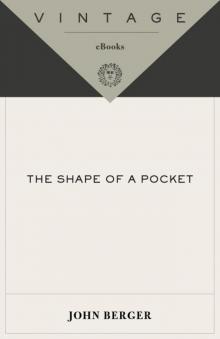 The Shape of a Pocket
The Shape of a Pocket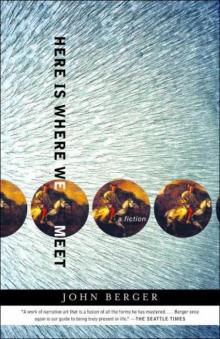 Here Is Where We Meet
Here Is Where We Meet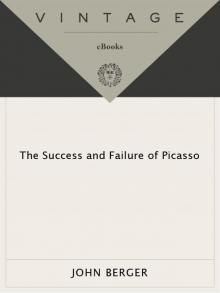 The Success and Failure of Picasso
The Success and Failure of Picasso G.
G. Photocopies: Encounters
Photocopies: Encounters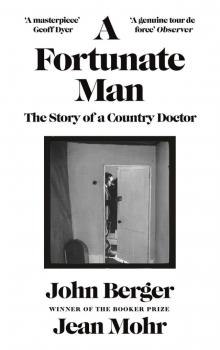 A Fortunate Man: The Story of a Country Doctor
A Fortunate Man: The Story of a Country Doctor And Our Faces, My Heart, Brief as Photos
And Our Faces, My Heart, Brief as Photos Titian
Titian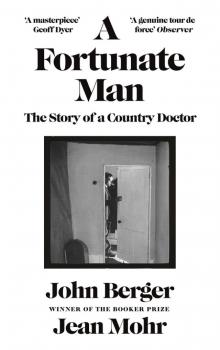 A Fortunate Man
A Fortunate Man Photocopies: Encounters (Vintage International)
Photocopies: Encounters (Vintage International) Selected Essays of John Berger
Selected Essays of John Berger